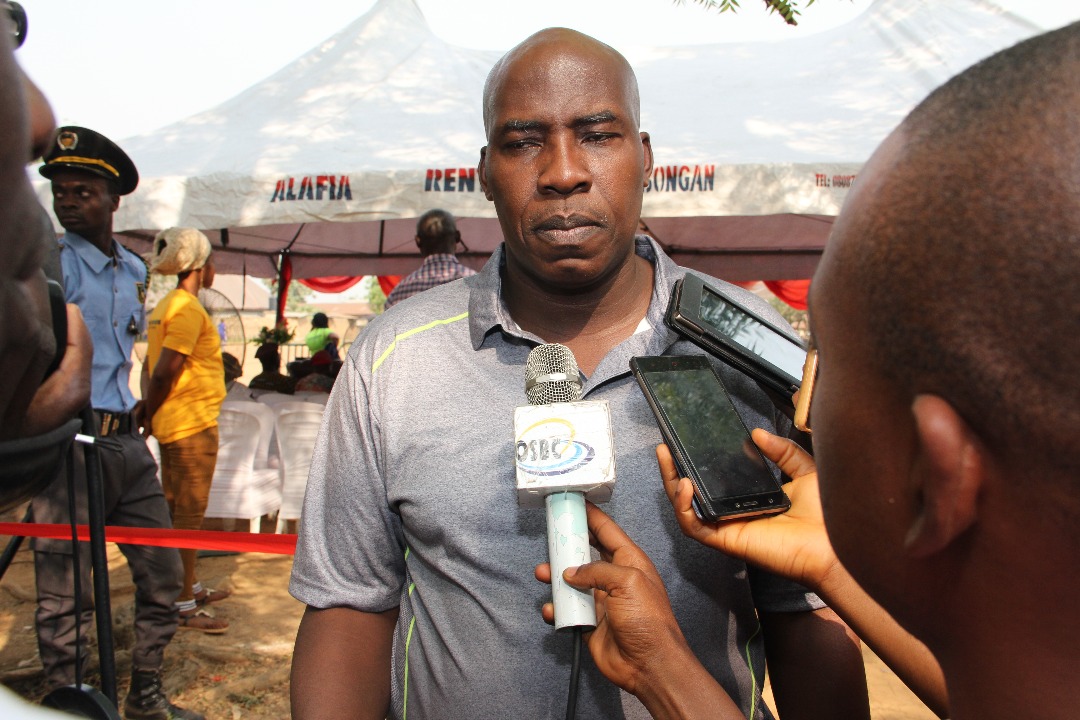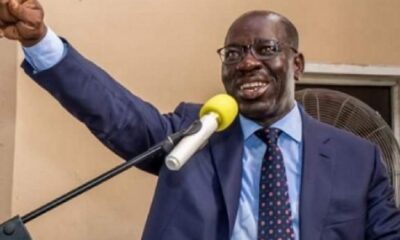News
We Have No Fuel To Sell –Marketers

Oil marketers under the aegis of Depot and Petroleum Products Marketers Association (DAPPMA) yesterday expressed concern over fuel scarcity in the country, saying they don’t have petrol to sell to Nigerians.
They said the Nigerian National Petroleum Corporation (NNPC) has not sent petrol to members’ depots.
DAPPMA’s executive secretary, Mr Olufemi Adewole, who stated the association’s position, urged the NNPC to help the association so as to alleviate the suffering of Nigerians.
In a statement he issued in Lagos, Adewole said, “Our members’ depots are presently empty. However, if the PPMC/NNPC can provide us with petrol, we are ready to do 24-hour loading to alleviate the sufferings of Nigerians and for the fuel queues to be totally eliminated.
“We, petroleum products marketers, do empathise with all Nigerians who are going through difficulties at this time by spending hours on fuel queues because of the current fuel scarcity due to no fault of theirs.
“DAPPMA members import about 65 per cent of the nation’s total fuel consumption, Major Oil Marketers Association of Nigeria (MOMAN) imports about 15 per cent and PPMC/NNPC import the balance of 20 per cent. However this scenario changed drastically due to several challenges faced by marketers”.
The DAPPMA executive scribe claimed that, while their members pay PPMC/NNPC in advance for petroleum products, fully paid-up petrol orders which have neither been programmed nor loaded is in excess of 500,000MT (about 800,000,000 litres).
He said, “As at today, there is enough petrol to meet the nation’s needs for 19 days at a daily estimated consumption of 35,000,000 litres. Sadly, some people have blamed marketers for hoarding products. Unfortunately, this is far from the truth.
“Hoarding is regarded as economic sabotage and we assure all Nigerians that our members are not involved in such illicit act. While all kinds of allegations have been made in the media, it is important to set the records straight, as Nigerians first, and as responsible businessmen and women who employ Nigerians.
“As it stands today, NNPC has been the sole importer of PMS into the country since October”.
Adewole added that the current import price of petrol is about N170 per litre, with NNPC, which absorbs the attendant subsidy on behalf of the federal government as the importer of last resort.
“The international price of petrol went up during the period of Hurricane Katrina and it has not dropped below USD$600/MT since then”, he noted.
Adewole said the exchange rate of the dollar to the Naira is N306 for petrol imports and the interest rate Nigerian banks charge is above 25 per cent.
His words: “Landing cost of PMS in Nigeria is above N145 per litre which means any of our members that imports will have to resort to subsidy claims, a policy already jettisoned by the government.
“It is on record that any time NNPC assumes the role of sole importer; there are issues of distribution because it is marketers who own 80 per cent of the functional receptive facilities and retail outlets in Nigeria.
“While we cannot confirm or dispute NNPC’s claim of having sufficient product stock, we can confirm that the products are not in our tanks and as such cannot be distributed. If the products are offshore, then surely it cannot be considered to be available to Nigerians”.
Adewole however assured that fuel marketers remain committed to the progress of the nation and its citizenry, as therein lies their own profitability and fulfilment.
He also traced the current scarcity of petrol to the challenges encountered by Direct-Sale-Direct-Purchase (DSDP) initiative adopted by the Nigerian National Petroleum Corporation (NNPC).
LEADERSHIP reports that when the incumbent Minister of State for Petroleum, Ibe Kachikwu, was Group Managing Director of the NNPC, he replaced the crude-for-products exchange arrangement popularly referred to as crude swap with the DSDP arrangement.
The DSDP was adopted to replace the Crude Oil Swap initiative and the Offshore Processing Arrangement so as to introduce and entrench transparency into the crude oil for product transaction by the Corporation in line with global best practices.
Under the old order, crude oil was exchanged for petroleum products through third party traders at a pre-determined yield pattern.
The DSDP option was intended to eliminate all the cost elements of middlemen and gives the NNPC the latitude to take control of sale and purchase of the crude oil transaction with its partners adding that the initiative would save one billion dollars for the Federal Government.
But in a statement Adewole said the initiative recently ran into difficulties, prompting firms involved in the programme to opt out.
How NNPC Caused Fuel Scarcity —Iheanacho
However, an oil and gas merchant, Capt.
Emmanuel Iheanacho, has attributed the persistent scarcity of petrol to monopoly of the product by the Nigerian National Petroleum Corporation (NNPC).
Iheanacho who is also the chairman of Integrated Oil and Gas Ltd noted that the inability of NNPC to create a window for private importers to import petrol also contributed to the scarcity.
According to him, the current shortage in fuel importation gap was caused by the landing cost margin of N171 per litre and the selling cost pegged at N 145 per litre.
Iheanacho said that this was not realistic for marketers to import and sell at that rate.
“The selling of the product at N145 per litre is no longer feasible with the current exchange rate. Shortage of foreign exchange and increase in crude prices has made it unprofitable to import petrol and sell same at N145 per litre.
“The problem is that importation of petrol is being handled, almost 100 per cent, by NNPC, while private importers backed out because the increase in crude price has made the landing cost high”.
Iheanacho said that the marketers’ huge debts of over N800 billion had also contributed to their inability to import petrol, adding that most independent marketers had closed their companies due to inability to pay their workers.
He urged the federal government to settle all the outstanding debts owed marketers since 2015.
According to him, commercial banks have started taking over the property and tank farms of some companies that could not pay back their loans.
Mid-East Tensions To Raise Oil Price To $80pb In 2018 – Report
Meanwhile, a new report has painted a scenario where oil prices could reach a record level of $80 per barrel in 2018.
According to an analysis by financial firm, Nomura, increased tensions in the Middle East next year could drive up global oil prices and have knock-on effects on inflation.
A “bigger proxy war in the Middle East” is one of Nomura’s 10 possible “grey swan” events for 2018.
These are unlikely but impactful scenarios that could impact markets next year, outside of the more widely discussed possibilities such as the Italian election and US impeachment risk.
Recent conflicts in the Middle East have “tended to start with a bang, but then assumed a ‘low intensity’ character” without engulfing the entire region, as occurred in Yemen and Qatar, the analysis said.
The report pointed out that although it is likely “this pattern will hold in 2018”, intensified tensions could threaten regional stability and drive up oil prices.
Yemen is currently experiencing a conflict in which more than 60,000 people have been killed or wounded, and which has triggered a cholera epidemic and famine.
Meanwhile, Qatar is suffering from a blockade enforced in June by Saudi Arabia, the United Arab Emirates, Bahrain and Egypt.
Under a stress test scenario in which Brent oil rises to $80 per barrel, an increase of around 30 per cent from current prices, headline inflation in 2018 would rise by 0.4 and 0.9 percentage points in the US and Eurozone respectively, while Japan could see core inflation breaching 1.5 per cent.
The biggest winners from an oil price shock (outside those directly affected by regional tensions) would be Russia, Colombia, Malaysia and Brazil.
Meanwhile, the analysis said, China, India, Indonesia, Thailand, South Africa and Turkey would be among the losers, just as the risk of imminent escalation are biggest in two areas, the analysis said
Oil Rise As Production Cuts Tighten Market
But Oil prices rose yesterday on the back of an outlook for healthy demand amid ongoing production cuts led by OPEC and Russia.
U.S. West Texas Intermediate (WTI) crude futures were at 58.50 dollars a barrel.
The Organisation of Petroleum Exporting Countries (OPEC), the Middle East-dominated producer club, and Russia, the world’s single biggest oil producer, have been withholding output to tighten the market and prop up prices.
The agreement to cut started last January and is set to cover all of 2018.
Jabar al-Luaibi, oil minister of OPEC-member Iraq, said there would be a balance between supply and demand by the first quarter of 2018, leading to a boost in oil prices.
The production cuts came amid healthy global demand, which many analysts expect to hit 100 million barrels per day (bpd) for the first time at some point next year or in 2019.
Call For Increased Pump Price Irrelevant – Stanel Group
Meanwhile, the managing director of Stanel Group, Stanley Uzochukwu, has said the recent call by petroleum downstream operators on the federal government to increase petroleum pump prices is irrelevant.
Uzochukwu who said this in solidarity with Nigerians who are made to suffer fuel scarcity believed to have been caused by hoarding said at a time Nigeria was coming out of recession, calling for pump price increase was not necessary because the business of selling fuel is still very lucrative at N145 per litre.
Speaking at a press briefing in Awka, the Anambra State capital, the Stanel Group boss said his filling stations nationwide get supplies from the NNPC, sell at N145 and still makes profit, even without any further increase in pump price.
The CEO said that Stanel filling station at Ultra-Modern Luxury Mega Centre in Awka sell petrol for N145 per litre and 24 hours a day since the beginning of the crisis.
It would be recalled that few days to the yuletide season major marketers called on the federal government to increase pump price failing which they would embark on nationwide on a general strike.
This they suspended after some negotiations with the government, but unfortunately triggered panic buying that now snowballed into scarcity, which the NNPC said was caused by hoarding
(Leadership)
-

 News2 days ago
News2 days agoMay Day: Babayemi Praises Tinubu Over Salary Increments
-

 News4 days ago
News4 days agoBreaking: Edo Governor, Obaseki Increases Minimum Wage To N70,000
-

 Opinion2 days ago
Opinion2 days ago…Of Osun Poly, WAEC, NECO, JAMB And Half-Baked Matriculated Products By Tope Abiola
-

 News2 days ago
News2 days agoFracas At Osun Workers Day Rally As Two Factions Of NULGE Clash




